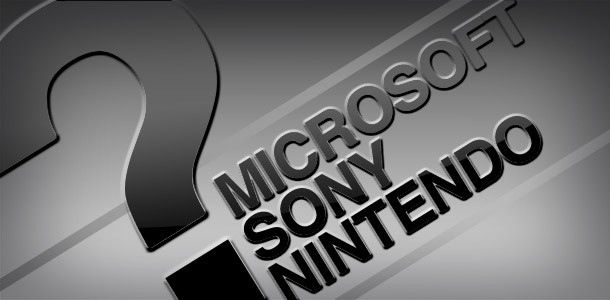Please support Game Informer. Print magazine subscriptions are less than $2 per issue
Editorial: The Issues Facing Next-Gen Hardware

Thinking about new consoles is always exciting, even though we're currently enjoying a period of plenty. Although I don't want to speculate on specific tech specs, there are a lot of questions regarding the next round of systems; the answers to which will go a long way in determining what gaming looks like in the future. Of course, nobody knows exactly what the future will look like – not even the hardware manufacturers or developers themselves – so these issues are just the tip of the iceberg, and pure speculation on my part. Please feel free to add your own thoughts and opinions in the comment section below.
RELEASE DATE
Nintendo aims to be first with the Wii U next year – which is probably when we'll hear the first official whispers from competitors Microsoft and Sony about their next home consoles. I'd guess the next PlayStation and Xbox will come out in the holiday 2013 season. Someone may push to spring of 2014, while holiday 2014 seems like a long ways off.
Who comes out first, Sony or Microsoft? There's no way to tell, but I'd have to think that Sony doesn't want to release too long after the next Xbox in order to avoid the year-long lag time of the PS3, which enabled Microsoft to gain so much ground on it.
COST
Given that these new systems will likely be packed with sexy new tech, I'd think it's hard to avoid a $399 price tag. And I certainly hope for my wallet's sake that Sony's learned its lessons about going above the $499 mark. Nintendo traditionally is cheaper, and it will be interesting to see how the public reacts to the necessary price tag of the Wii U's bells and whistles. I imagine that system doesn't come in under $300.
Although it seems that companies could sell more consoles if they got a full-featured system at $299, for example, I wonder how much impetus Sony and Microsoft in particular have to make their next consoles that cheap (and risk losing lots of money on each system sold). I'm sure they know they're going to sell millions of units of their next systems in the early days. I say this because I believe both companies can reliably count on selling decent numbers of the Xbox 360 and PS3 even after their new platforms come out as they keep going down in price. Microsoft and Sony are probably betting on the fact that the millions and millions of current console owners are planning on getting the next system iterations even if it's not on day one. The good install base of both consoles gives them this luxury.
DIFFERENT MODELS?
Of course, cost is directly tied to each console's features. This generation of systems offered numerous hardware configurations. This drove some consumers mad and left others confused, and it's hard to know if ultimately this strategy of releasing different versions of the hardware was effective or not, for Sony and Microsoft in particular.
There’s also the issue of whether these systems will contain features such as backwards compatibility, different hard drive sizes, various ports, network options, media compatibility, and much more. Personally, I think gamers in the early days of a system make too big of a deal over things like how many controller ports a system has or even backwards compatibility when assessing whether they want a console or how good/bad the platform is as a whole. Still, it'll be interesting to see which of these features make it onto the next generation and how they impact the price.
Read on for more, including the questions of new IP, the price of games, and other issues.

PERIPHERALS
With Kinect – and to a much lesser extent Move – now considered an inescapable facet of the Xbox 360 and PlayStation 3, can we count on these peripherals to be sold in bundles along with the new hardware? It would seem like suicide to make consumers buy new versions of these peripherals just for the new consoles, but the question remains of how integral will Kinect and Move be to these companies' next platforms. Depending on how well these peripherals do before the next systems come out will also determine to what extent a thing like Kinect might even become mandatory. But I doubt this will happen. Of course, Microsoft could make it mandatory in a de facto sense by automatically including a Kinect with every system (built-in, perhaps?) and raising the console's overall cost – but that would be evil.
ONLINE SERVICES
The online services of all three console manufactures are getting better every day thanks to updates, and I assume all your accounts, trophies, etc. will seamlessly migrate over, but I wonder if the next systems will launch with some sort of 2.0 for their online services that tries to take them to the next level in some way.
PRICE OF GAMES
Given that the industry's making so much money at the $60 software price point and that studios' development costs (as well as publishers') are only going up, I see no reason that software prices will drop. If anything, games will only become more expensive.
There are alternate pricing models that publishers flirt with from time to time, like THQ, but price is a perception. If you have a lower price – even if it's a good game or inventive pricing model – you'll come off as a value product. Call of Duty et al. will be full retail price because Activision wouldn't want it to appear to be anything less than a marquee product.
More and more games are now offered as digital downloads as well as retail releases, but I imagine retail copies will be the preferred form for the foreseeable future, so their pricing should remain dominant.
For developers, it'll be interesting to see how potentially rising development costs affect them. What kind of middleware will become dominant for the next systems? Will there be less or more independent studios? Will publishers demand a greater return on investment and will that mean that developers will take fewer chances?
NEW IP VS. SEQUELS
Getting the right mixture of software for a console launch isn't easy, and there are arguments to be made for both sequels and new IP at a launch. It's easy to get excited by a known quantity (and safe for publishers), but it's also probably easier to introduce a new franchise at a time when people are just excited to be playing a new system.
Regardless, I think the strength of the launches should be better than we're used to. I'm guessing development for these upcoming consoles should be strong because it sounds like the console manufacturers are looping studios in earlier than ever, and I think (or is it hope?) that even a company like Sony is trying to help developers by giving them a platform that is not hard to work with.
That being said, I wonder if a more harmonious development culture between the various systems will create fewer third-party exclusives as things become more homogenous and publishers push for the cost savings of parallel software development.
Another area of further interest is how or if the burgeoning market of downloadable games will make the jump along with the new consoles (see also the online section above). It would be great if companies tried to debut some triple-A DLGs alongside with launch titles. I hope that the publishers and console-makers are seeing these titles as benefits to the systems themselves and deserving of just as much of the software spotlight instead of just necessary content for their online services or an afterthought. This would necessitate getting these developers dev kits well in advance of launch day.
It’s an exciting time to be a gamer, and the next round of systems will bring new games and experiences with them. However, a lot has to happen between now and then, and a plethora of questions remain.










